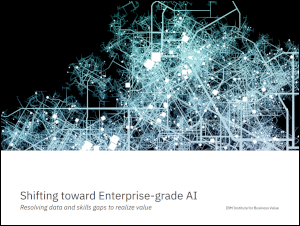Ungated Post | 16 Jul 2019
Shifting toward Enterprise-grade AI

Oxford Economics worked with IBM’s Institute for Business Value to examine how artificial intelligence (AI) is moving beyond the hype cycle, as more and more organizations seek to adopt AI-related technologies. These organizations are focusing on prioritizing functional areas and use cases, placing a stronger emphasis on topline growth, taking up a renewed interest in their data infrastructure and articulating greater unease about the skills of their knowledge workers. This report explores how they are approaching strategic imperatives, defining value drivers, building foundational capabilities and improving access to talent — as well as how their efforts could drive exponential competitive advantage.
To understand their thinking, we surveyed 5,001 global executives representing 18 industries, including leaders of government agencies and educational institutions, and 19 functions. Roles of responding executives included C-level executives — CEOs, CFOs, CHROs, CIOs, CMOs and COOs — as well as heads of customer service, information security, innovation, manufacturing, risk, procurement, product development and sales.
Our Thought Leadership team produces original, evidence-based research made accessible to decision-makers and opinion leaders.
Oxford Economics’ team is expert at applying advanced economic tools that provide valuable insights into today’s most pressing business, financial, and policy issues.
Related Services

Post
The economic impact of the sports activities of public service media
This study shows how the sports activities of public service media supported €4.5 billion of GDP and 57,000 jobs across 31 European countries in 2022, taking direct, indirect (supply chain), and induced (wage-funded expenditure) impacts into account. The report also highlights wider economic benefits of public service media sports coverage, such as the way in which it leverages sponsorship income for sports bodies.
Find Out More
Post
Global Trade Education: The role of private philanthropy
Global trade can amplify economic development and poverty alleviation. Capable leaders are required to put in place enabling conditions for trade, but currently these skills are underprovided in developing countries. For philanthropists, investing in trade leadership talent through graduate-level scholarships is an opportunity to make meaningful contributions that can multiply and sustain global economic development.
Find Out More
Post
Mapping the Plastics Value Chain: A framework to understand the socio-economic impacts of a production cap on virgin plastics
The International Council of Chemical Associations (ICCA) commissioned Oxford Economics to undertake a research program to explore the socio-economic and environmental implications of policy interventions that could be used to reduce plastic pollution, with a focus on a global production cap on primary plastic polymers.
Find Out More